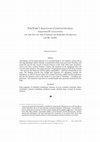Papers by Maarten Halff
Archivio Veneto, VI serie n. 22 (2021), pp. 5-49, 2021
Nicolò Barbaro’s famous account of the siege of Constantinople in 1453 is frequently cited in stu... more Nicolò Barbaro’s famous account of the siege of Constantinople in 1453 is frequently cited in studies, but the lists of Venetian noblemen in it are less well known. Based on a close examination of Barbaro’s manuscript and a biographical analysis of the noblemen in question, this paper offers new insights into Barbaro’s work and, for the first time, determines the date of its completion (between 1503 and 1507). It also presents unnoticed archival records on Barbaro himself – possibly the last surviving Venetian nobleman of the siege – adding context to help understand his work. This was not only an account of the conquest of Constantinople, but also a living document in which, over decades, Barbaro kept track of the Venetians who had played a role in the city’s defense.
American Cusanus Society Newsletter, XXXVII, 2020
This paper discusses unpublished letters written in 1437 between Venetian correspondents in Venic... more This paper discusses unpublished letters written in 1437 between Venetian correspondents in Venice and Constantinople, and analyzes the light they cast on the diplomatic preliminaries to the Council of Ferrara-Florence. The letters highlight the importance of Michele Zono, a Venetian agent of Pope Eugenius IV active in Constantinople, and the political dilemma facing Emperor John Paleologos VIII.

Mediterranea. International Journal on the Transfer of Knowledge, 5 (2020), pp. 91-151, 2020
The legation sent by Pope Eugenius IV to Constantinople in 1437 played a critical role in the lon... more The legation sent by Pope Eugenius IV to Constantinople in 1437 played a critical role in the long diplomatic efforts towards a reunification of the Latin and Greek Churches, and paved the way for the Council of Ferrara-Florence (1438–1439). With some exceptions, such as the later Cardinal Nicholas Cusanus, the members of the delegation have not received wide attention. This paper presents a biographical analysis of all those involved – the nuncios, the financiers and the galley commanders – and their relationship to the Pope. The findings provide new insight into Eugenius IV’s diplomacy towards the Byzantines, as well as Cusanus’s place in it. Cusanus’s presence added conciliar legitimacy, but the key functions were in the hands of a core team of Venetians – including non-patricians – who had prior experience in Constantinople and a personal connection to the Pope.
Revista Española de Filosofía Medieval, 26/1 (2019), pp. 29-58, 2019
While Cusanus' literary sources for his engagement with Islam have been closely studied, question... more While Cusanus' literary sources for his engagement with Islam have been closely studied, questions about possible personal encounters with Muslims, and the role of non-literary sources in developing his concept of interreligious dialogue, remain largely unaddressed. This paper presents original archival research to identify the only person whom Cusanus mentions in the Cribratio Alkorani by name as an oral source about Muslim beliefs-an Italian merchant active in Constantinople at the time of Cusanus' visit in 1437. In doing so, it casts new light on Cusanus' treatises on Islam and on his interaction with Muslims.
Initiatives to change or sidestep presidential term limits are often presented as a response to p... more Initiatives to change or sidestep presidential term limits are often presented as a response to popular demand, yet tend to be deeply polarizing and may even lead to violence. Opinion on the legality of changing term limits tends to be sharply divided not only in the country concerned but also among the international community. In an effort to fine-tune policy debate, this paper looks at the normative framework relating to term limits and their removal. It recommends that, in the absence of clear international norms, the issue be approached as a matter of maintaining confidence in a country’s electoral process and political system. This means focusing on the process by which term limits might be amended or interpreted.
What makes the contestants in an election accept its outcome? This policy brief published by the ... more What makes the contestants in an election accept its outcome? This policy brief published by the Kofi Annan Foundation puts forward the notion that confidence is a key factor, and that this is shaped by the broader political context in which elections take place, not just by the quality of the electoral process itself. A comprehensive strategy for promoting the peaceful acceptance of election results should therefore include a broad range of political and technical measures – not limited to electoral assistance – as catalogued in this brief. An annex presents an annotated selection of recent scholarly publications, to highlight connections between policy and academia in this new field of research.
Book reviews by Maarten Halff
Renaissance Quarterly, 2020
Drafts by Maarten Halff
This volume is an edited compilation of the electoral legislation of Somalia between 1953 and 196... more This volume is an edited compilation of the electoral legislation of Somalia between 1953 and 1969 - the only period in Somalia's history during which country-wide multi-party elections were held. In the course of these sixteen years, a combined total of nine electoral events took place in the British Protectorate, the Italian Trust Territory and subsequently in the independent Somali Republic. For practically each event, a new legal document was issued, addressing issues of political representation (the electoral system) as well as voting procedures. The sources for these laws, decrees and ordinances have become very scarce, particularly in Somalia itself.
Conference Presentations by Maarten Halff
Uploads
Papers by Maarten Halff
Book reviews by Maarten Halff
Drafts by Maarten Halff
Conference Presentations by Maarten Halff